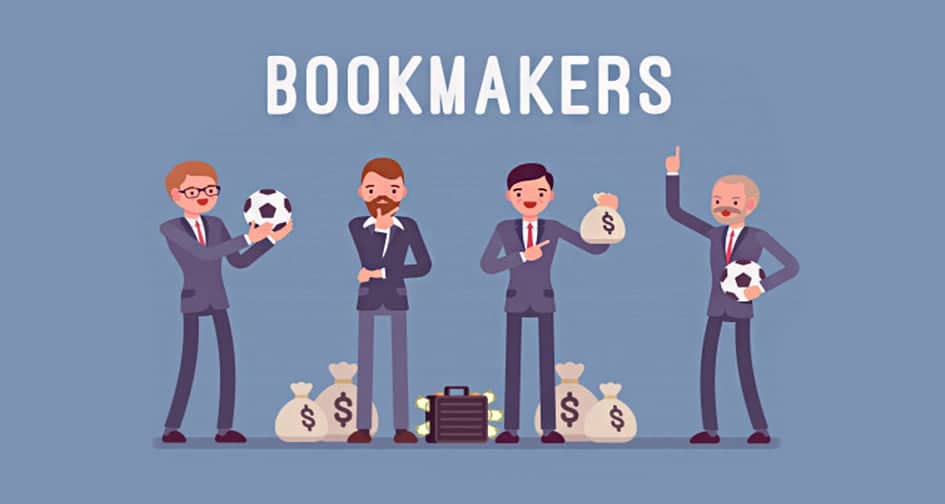A bookmaker or ‘bookie’ as mostly referred in slang, is someone who facilitates gambling, especially in sports events. Their role largely constitutes setting odds, placing bets, and paying out winnings. Their work also includes adjusting the books so that the number of people betting on a win or loss remains even.
Not so long ago, sports gambling had been illegal in most states in the USA, which sparked illegal bookie operation. It was not uncommon to find some bookies involved in organized crime, although there were still some who operated independently.

It was, however, not until 2018 when the US Supreme Court ruled in favor of sports betting. The new ruling against the Professional and Amateur Sports Protection Act would open doors to sport betting in the whole country provided any state agreed to favor it.
The immediate result has been an increased number of bookmakers over the past couple of years.
Similar to the term ‘The house always wins’, many people have always been left wondering why it was so difficult beating the bookies. This is because that the bookmakers always end up winning. As we delve deeper into the subject, let’s start by expounding on some few concepts that will better help us understand how bookmakers make money.
Balancing the Book
The term ‘bookmaker’ stems from the practice of laying bets, and most precisely, recording such bets on a ledger. Hence, the phrase ‘making a book’.
It is through making a book that the bookie will lay each possible outcome of the given events, in such a way that they will be guaranteed profit. That is regardless of the outcome of the event.
Better explained, the bookie achieves this by the setting of appropriate odds in every possible outcome, which allows them to make an amount of money on each final outcome.

Similar to the Punter, the bookie also has no control over the results of the sporting events. They can, however, control how much they rake in or lose in any particular outcome. But how do they exactly do this?
When it comes to setting odds, bookies set the prices in a way that reduces variance, ensures profit, and at the same time reflects the actual probability occurring. It is this balance that will ensure that the punters are still attracted to the bet outcome, and the bookies still make a profit.
Vig, Vigorish/ Overround Concepts
Also known as Juice or edge, this concept revolves around how bookies start off by setting their margin, i.e. 5%. The odds they will set afterward on various outcomes will incorporate this commission. As we will see further down, it is this margin that will allow the bookies to make money.
To better explain this, we will use the example of a coin toss which represents a 50/50 possible outcome. For every coin flip, there’s a 50% chance for tails and another 50% for heads. If a bookmaker were to follow this assumption and offer true odds for the coin flip, we would expect them to offer even money. That is a 2.00 in decimal odd and 1/1 in fractional odds. But that is not always the case.
Instead, they always provide an odd less than 2.0, let’s say 1.98 for both outcomes as it would guarantee a profit to the bookmaker for either of the result (tail or heads).
If our bookie was offering the true odds on the coin flip, it would mean that every successful outcome after $100 stake would result in $200, which is twice e the original stake. But what if the bookie has 100 customers all placing $100 bets on the coin flip. 50 betting on the head result, and the remaining 50 on tails.
If the results was ‘heads’, that would mean that the 50 who would have staked on ‘tails’ would have lost a cumulative of $5000. But then, the bookies would use the same money to pay off the ones who had won. That would be in addition to returning the initial $5000 they had staked, bringing the total to $10,000. If you were following closely, you will realize that the bookmaker will not have made a single coin in the entire transaction.
But what about the other scenario where they used lesser odds of 1.98 on either outcome. This would mean that for those who won, they would get a cumulative $5000 as their initial stake, and an additional $4900 as profit. This is because $5000*1.98 (odd) equates to $9900. The remaining $100 would be the profit the bookmaker makes. That is regardless of whether the punters lose or make a win in their bets.
Hence, the bookies make money by calculating the probability of each game and then subtracting the margin. This gives rise to the new odd (1.98 in our case scenario).
Why Do Odds Move/Change in Response to Betting?
When it comes to calculating odds, the bookies arrive at the real probabilities of an event outcome by using statistics, history form, and sometimes human opinion. The more data there’s, the more likely it is to reflect on the real probability. On the reverse, if there’s less data on the outcome, the bookmakers become more cautious. Hence, their odds will be lower than the real probability.
However, it is important to note that probability is not always the only aspect behind odds pricing, bookies are most likely to set odds based on how likely they perceive that punters will stake on each outcome. This allows them to further balance their books.
A good example is when betting on favorites, let’s say a match against Arsenal and Norwich City. Where Arsenal happens to be the favorite. Since most people will be staking on Arsenal, the Bookies may decide to set a higher margin on Arsenal. This would explain why there’s always such a big variation on odds against such games. And even if you staked on Norwich City, and it actually won, they wouldn’t mind as they would be making money altogether.
Moving on further, most punters wonder why the bookies suspend odds and markets, and whether they still make money. Yes, suspended odds are not a rare phenomenon, but it is actually another way that bookies make money.
Think of it this way, Bookmaking being a private business, it can affect when and how they offer their odds. So, yes, if a bookie doesn’t like the way the betting is going and that they’ve been overexposed to a particular outcome, they can decide to drop the odds. They often lower the odds dramatically or even suspend the market in extreme cases. Unfortunately, there’s not much you can do as a punter.
One way to avoid being trapped in such a scenario is staking on your games early enough, or being warier of live betting altogether.
How Does Competition Control Prices in Bookmaking?
Although a Bookmaker is a private business, not being the only one in the market actually favors the gambler in many ways. Otherwise, the punter would be most advantaged if there’s were only a few bookmakers as they would tend to control the market as they wished. It would be more of a ‘take it or leave it’ scenario.
For a bookmaker to make money, they need to attract the punters. This is not always easy as the market is now flooded with bookmakers all wanting to make a profit too. Today, all a punter needs to do is use a site and run a comparison on the bookmaker offering the best odds.
It is common to see bookmakers try to push their odds, all in an attempt to balance their books. They, however, have to be careful as pushing the odds too much to the extreme discourages the punter from gambling with them.
Whereas competition might dictate the amount of money the bookie will make, it sure does serve to make sure that the punter is not exploited by the bookmaker.
Final Thoughts
It is always every gambler’s dream to beat the bookies, but as previously discussed it is not as easy as they have almost perfected the art of balancing the books. Instead, you should focus more on making your wins as the bookies will make money either way.
Always practice researching on which bookmakers are offering the best odds, bet on low edge markets (i.e. Head to Head matches), and don’t hesitate to us multiple betting sites when possible.




